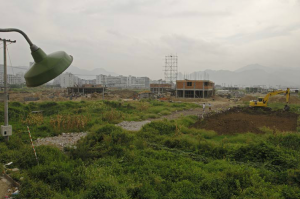Lishui, located in the Zhejiang province, houses 2.5 million citizens. Within the province, Lishui ranks first in the natural resources: timber, waterpower, mineral deposits and wilderness. However, more recently, Lishui’s economy has been characterized by rapid industrial development. The main industries include wood and bamboo production, textiles, pharmaceuticals, like herb medicines, and electronic machinery. The commercialization of bamboo and natural products contributes to the development of a comprehensive agricultural program. Their economy thrives on the production of 180 brand name products, which are sold both domestically and exported to over 100 foreign countries.

In 2010, Lishui’s foreign trade equaled 1.5 billion U.S. dollars, which represented a 38% from 2009. Thus, demonstrating the rapid and increasing influence of cheap exports on the city’s economy. However, with this increasing industrialization, many people may be out of work. As a country, China announced that 5 to 6 million workers will be laid off in the coming years to “curb industrial overcapacity and pollution” (HKFP). Thus, it is worth questioning whether the movement towards an industrial manufacturing economy will displace workers in Lishui. In addition, Lishui is filled with beautiful landscapes and scenic attractions. However, we can infer from its isolated location that the city attracts more Chinese than foreign tourists.
Sources:
https://en.wikipedia.org/wiki/Lishui
http://china-trade-research.hktdc.com/business-news/article/Fast-Facts/Lishui-Zhejiang-City-Information/ff/en/1/1X000000/1X0740X3.htm
http://ngm.nationalgeographic.com/2007/06/instant-cities/leong-photography
While a layoff of a few million would barely shift China’s unemployment rate, it does signal an economic transition. China must shift its economy towards the service sector, and away from the industrial sector. The United States went through a similar transformation. Indeed, a large part of the midwest is referred to as the rust belt due to its decline in industry and consequent population loss. China is currently in the mist of a similar demographic shift, which will see a transformation in both the location and types of jobs available.
On September 7, 2015, a misused electric welder ignited methanal and caused an explosion at Chemical Co Ltd’s plant in Lishui. Although this tragedy was an accident, it exposes Lishui’s lack of experience in the industrial industry. In addition to Lishui’s industrial movement, China must preserve its tourist attractions because international tourism still accounts for a significant portion of revenue.
Lishui is traditionally a farming land in the great Nanjing area and the agricultural and aquatic incomes occupy a major portion of the city’s revenue, in which the agricultural and aquatic produces mainly include crops and aquatic produce.
Current development has added industrial sectors to Lishui. In an effort to attract investors, the Lishui Industrial Development Zone contributes its great share in attracting invest funds. The zone is covered an area of 13 square kilometers and is 16 km away from Nanjing Lukou International Airport, 40 km to the Nanjing urban area. The industrial zone has drawn numerous national and international corporations to set op their subsidiaries in the district. Furthermore, the economic expansion in the satellite town has turned it into a fairly wealthy urban region.
Economic growth and environmental conservation have always seemed like two different approaches. However, the Lishui government has been putting stiff environmental rules into practice over years, and has spent significant funds to protect its environment including air, forest and water resource. The city has been awarded with numerous titles for its well preserved ecological environment and high forest coverage.
Work Cited:
Jiangsu.net http://www.jiangsu.net/city/city.php?name=lishui
Lishui(溧水) is a name of a district in Nanjing (Jiangsu Providence) and it is also a city in Zhejiang Providence (丽水). I think Hayley is talking about Lishui as a city in Zhejiang and you are talking about the district in Nanjing.
Yes- I am talking about the city. Sorry for the confusion!
The first industry in Lishui is agriculture. The second is the industry. The third is the investment. Lishui is considered as the third tier city in China, but it is number one in the ecological environment in Zhejiang providence. Fun fact: In summer time, Zhejiang providence could be really hot, especially in my city Hangzhou. Last summer, there were two weeks when the temperature hit above 100 F. People in Hangzhou consider Lishui as a summer resort because the temperature in Lishui is always much lower with their mountains and water.
Work cited: http://baike.baidu.com/subview/7753/7165425.htm?fromtitle=%E4%B8%BD%E6%B0%B4%E5%B8%82&fromid=2713089&type=syn#7
Oftentimes, industry in its infant stages is labor-intensive. This makes sense as heavy machinery requires high capital, while labor is comparatively cheap. The result is many laborers finding jobs in this sector and rapidly increasing production. This, in turn, allows for innovation and new methods, further raising output levels. However, labor wages eventually increase, while firms finally have the capital needed to purchase heavy machinery. So workers are made redundant by the machinery and lose their jobs. Although firms employ fewer people, production does not waver. Lishui is starting to encounter this situation of higher unemployment levels but no less output. How will the city and the unemployed react? JT mentioned a shift to the service sector, as that has been the traditional choice throughout history, but will we see the same in Lishui?
As you stated, traditionally a shift from industrial/labor-intensive manufacturing jobs to service sector jobs is likely going to occur in Lishui. The Chinese government has been pushing to increase the service sector’s overall share of GDP and as labor wages raise and investment in capital renders labor inefficient, Lishui and other similar industrial/manufacturing cities will make the gradual change.